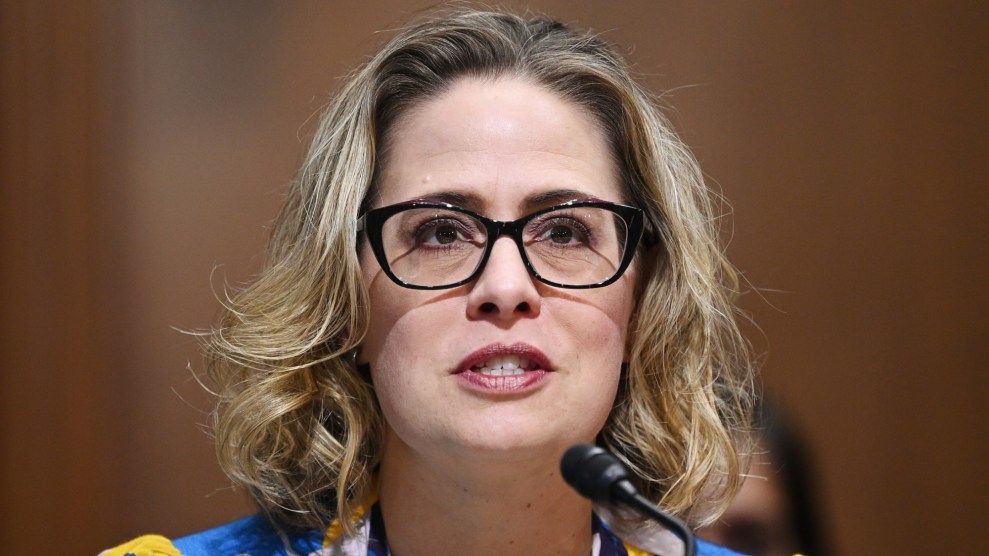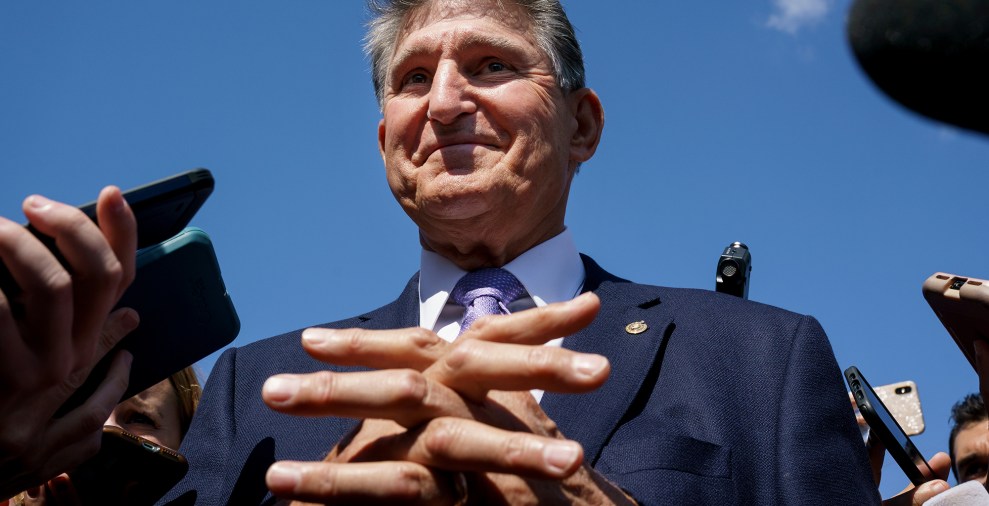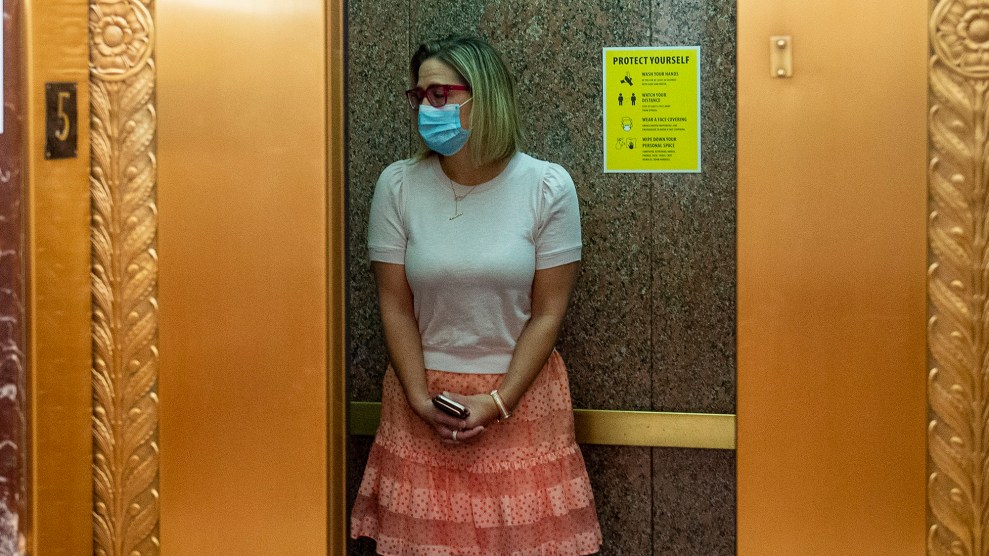
Mandel Ngan/Pool/AP
This story was originally published by the Guardian and is reproduced here as part of the Climate Desk collaboration.
Wildfires, deadly heat, drought and flooding show how climate change has “already arrived” in Arizona and action is desperately needed, according to climate and progressive advocates who helped elect Kyrsten Sinema to represent the state in the Senate.
Many of them are wondering why their senator seems to have “turned her back” on her background in environmental politics and is now blocking Democrats’ multitrillion-dollar legislation to address climate change. “The climate crisis is here—it has already arrived in Arizona,” said Vianey Olivarria, a director of Chispa Arizona, the state branch of the League of Conservation Voters, which had endorsed Sinema for senator. “We don’t have a lot of time to waste.”
Sinema is one of two centrist senators—with Joe Manchin of West Virginia—who have opposed the Biden administration’s $3.5 trillion budget bill that contains the bulk of the Democrats’ climate change agenda.
This summer, the earth in parts of Arizona cracked—desiccated by decades of megadrought. But some communities also flooded. Ferocious wildfires have eaten through half a million acres this year. And a prolonged, record-breaking heatwave—supercharged by human-caused climate change—killed dozens in Phoenix and surrounding suburbs.
This week Sinema was back at the White House for private talks with Joe Biden on the legislation, which would need the votes of all 50 Democratic senators to pass. It would enact dramatic cuts to greenhouse gas emissions, boost renewable energy programs and fund climate resiliency programs.
Sinema’s office has emphatically contested New York Times reporting earlier this month that Sinema demanded $100 billion in cuts specifically to climate programs. But she has said little in public on her position and her obstruction of the reconciliation package overall has confused, disappointed and angered progressive voters and climate activists in her home state.
Indeed, Sinema began her political career leading the Arizona Green party. Over the years, her politics shifted and she positioned herself as a moderate Democrat willing and able to work with Republicans that dominated state politics—but even then, she said she modeled herself after the late John McCain, the Republican senator of Arizona who pushed for bipartisan climate action throughout his career.
“When Senator Sinema ran for office, she promised to fight for climate change and invest in our communities,” said Casey Clowes, an organizer with the Sunrise Movement in Tempe, Arizona. In 2018, Clowes said she voted for Sinema, and volunteered for more than 250 hours to help send Sinema—the first Arizona Democrat in 30 years—to the Senate. “Now she’s been unaccountable and inaccessible,” Clowes said. “I think a lot of us are fed up.”
On Thursday, a group of veterans advising Sinema resigned, and accused her of hanging her constituents “out to dry.”
Unlike Manchin, Sinema has not publicly voiced her concerns with the reconciliation bill—aside from rejecting its overall price tag.
Manchin, a conservative Democrat who has received more in political donations from the oil and gas industry than any other senator, has made clear that he objects to provisions that would slash planet-heating emissions. But Sinema—who has become infamous for evading questions from constituents and journalists—recently told the Arizona Republic that she had “an interest in policies addressing climate change”, without offering much detail on which policies she was interested in. The senator has resisted raises to individual income and corporate tax rates to fund climate change and social safety net programs but hasn’t made clear what alternative funding schemes she would support.
“Since she’s been in office, it’s been nearly impossible for community members to connect with her,” said Columba Sainz, a consultant with Moms Clean Air Force in Arizona. “We don’t know whether Sinema will protect us.”
Sainz, whose youngest daughter has wheezing episodes and respiratory problems triggered by poor air quality, said: “In my family, heat is our enemy. It interacts with stagnant air to create and trap ozone pollution.” She works with other families who cannot afford air conditioning during punishing heatwaves. The state recorded more than 500 heat-related deaths in 2020, which public health experts say is probably an undercount. In Maricopa county alone, officials tallied at least 113 heat-related deaths this year so far.
“We need funding for adapting to climate change,“ said Gregg Garfin, a climatologist at the University of Arizona. Several cities in Arizona, including Phoenix and Flagstaff, have already made climate change a priority, starting community programs to harvest rainwater amid drought or plant trees to shield poor, urban neighborhoods from the punishing summer heat. “But addressing the crisis has been an unfunded mandate,” he said. “They need more investment.”
The budget bill endorsed by the majority of Democrats in Congress would finance a Green Bank to help communities install solar panels and electric vehicle charging stations, and create a Civilian Climate Corps of young Americans to build climate-resilient infrastructure.
Clowes, who has a chronic illness that makes her especially vulnerable to heatstroke, said Sinema’s resistance to legislation that could help fund cooling centers and heat-defying infrastructure, and bring down the emissions fueling extreme heat in the region, has left her angry. Along with other members of the Sunrise Movement, Clowes camped outside Sinema’s office in Phoenix this week. “It’s really painful to watch my home become uninhabitable,” she said. “And see Senator Sinema turn her back.”















